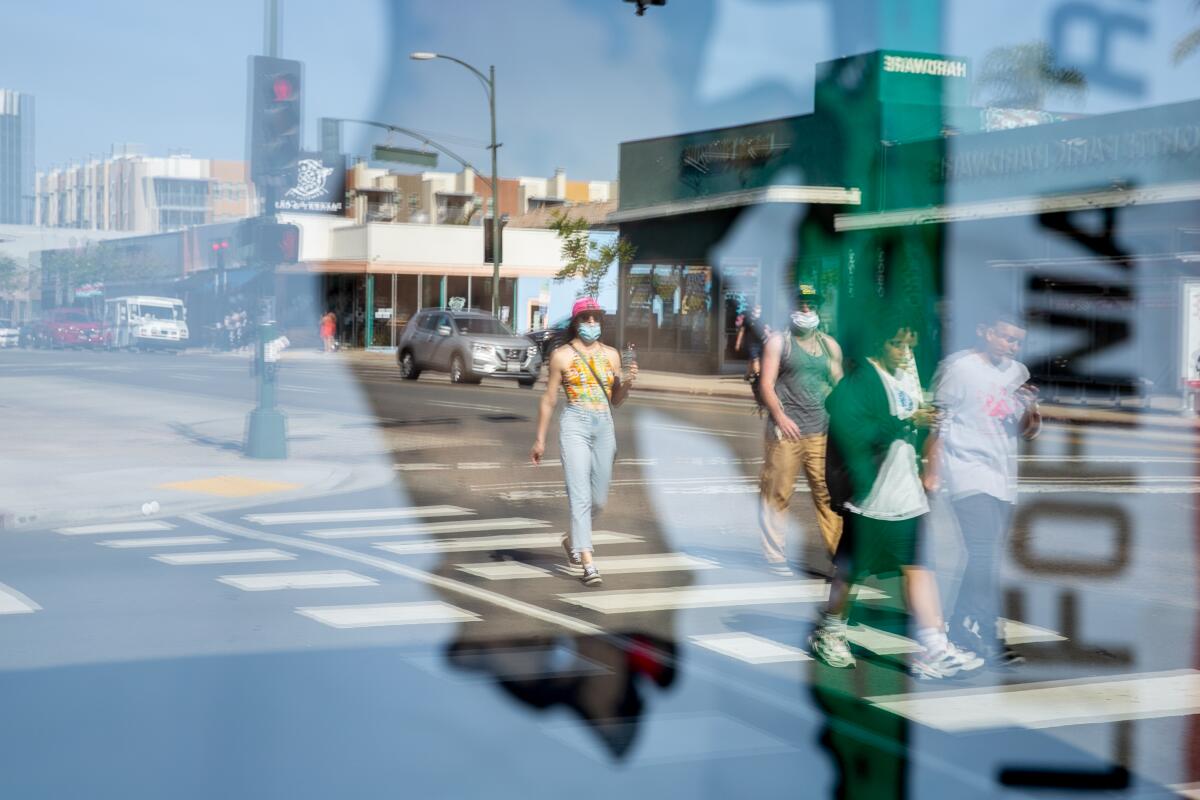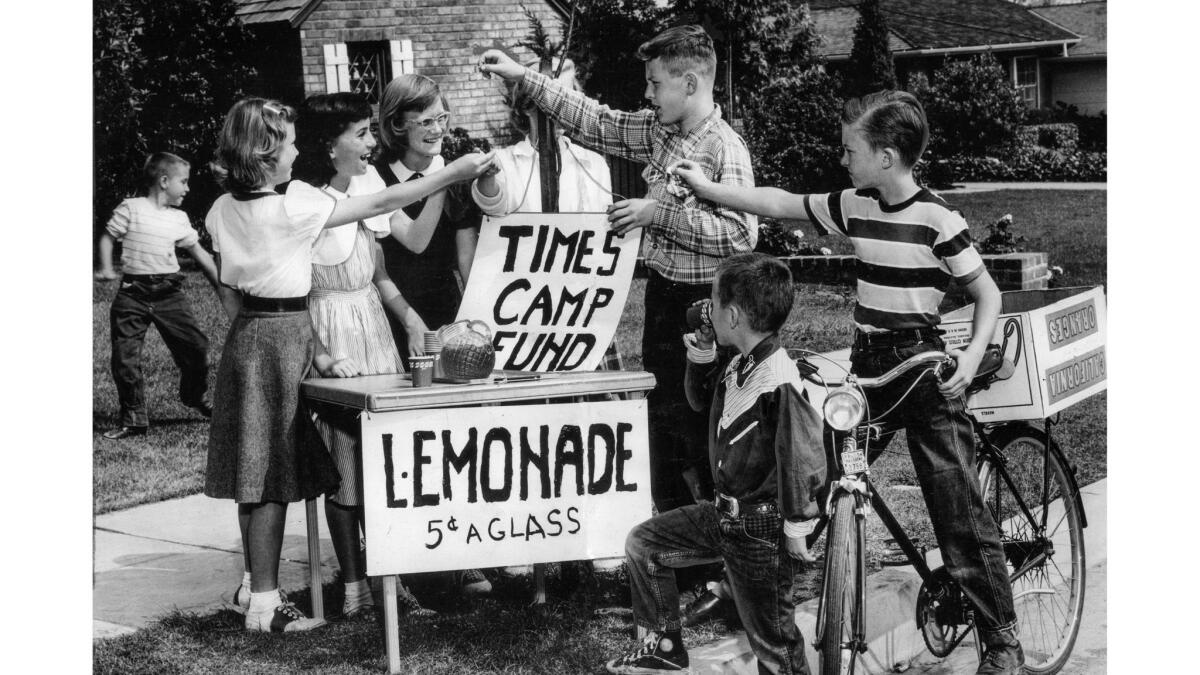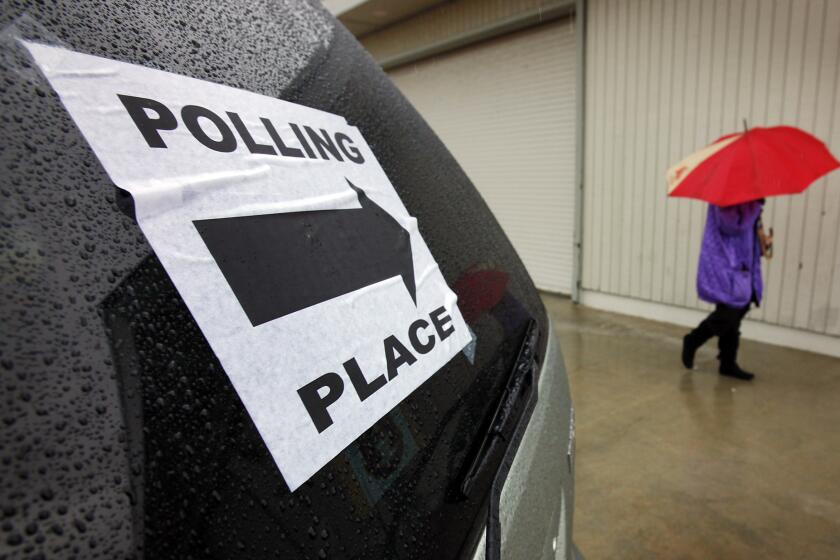Newsletter: California’s progress against COVID-19

Though COVID-19 deaths continue to rise and there are concerns about the future, some encouraging signs are emerging in California’s fight against the coronavirus.
TOP STORIES
California’s Progress Against COVID-19
Three months into California’s battle with the coronavirus, there are growing signs that the outbreak is ebbing, even as the state death toll climbs past 3,200.
On average, 500 Californians are dying from COVID-19 infections every week, and the disease is taking a disproportionate toll on black and Latino people. There remains deep worry about a resurgence of the disease in the fall, and officials warn it may be with us for the next two years without a widely available vaccine.
Still, other metrics analyzed by The Times show significant progress — enough that even some of the most cautious local health officials have agreed to begin reopening the economy. The number of newly identified coronavirus cases across California declined last week from the previous week, dropping to 12,229 cases from 13,041. That’s a notable achievement, given the amount of increased testing. Hospitalizations have dropped more than 15% from a peak six weeks ago.
Regional disparities remain. Napa County said it had received state approval to reopen restaurant dining rooms and retail stores for in-person shopping; wineries and hair and nail salons remain shut, and tourism is not allowed.
By contrast, L.A. County Supervisor Kathryn Barger expressed a goal for a reopening by July 4. But the county director of public health said that remains contingent on what the data say.
Start your day right
Sign up for Essential California for the L.A. Times biggest news, features and recommendations in your inbox six days a week.
You may occasionally receive promotional content from the Los Angeles Times.
No Rallies, but ...
For the third week in a row, President Trump will fly to visit a business involved in the coronavirus response that just happens to be in a swing state that may determine who wins the November election.
On Thursday, the president is set to tour a Ford Motor Co. factory that launched a crash program to build ventilators and personal protective gear. If it follows the pattern set in trips to Arizona and Pennsylvania, the taxpayer-funded event will feature blaring music, testimonials from supporters and invective against his perceived enemies.
Ever disdainful of experts, Trump has yet to wear a mask in public, despite guidance from federal health authorities and the White House coronavirus task force. It’s unknown if he will don one Thursday, but if he doesn’t, he would be in violation of Ford’s safety protocols as well as in technical violation of an executive order from Michigan Gov. Gretchen Whitmer, a frequent target of Trump’s jibes.
A Question of Ethics
A federal judge’s sweeping order to move thousands of homeless people away from freeways in Los Angeles is drawing objections from advocates and Mayor Eric Garcetti who fear it could lead to confrontations with police and endanger the health of those living on the streets during the outbreak.
In the order issued last week, U.S. District Judge David O. Carter called for the relocation of up to 7,000 people living near overpasses, off-ramps and on-ramps, saying they face severe health risks from tailpipe emissions and car crashes.
If carried out, it would mark a major shift in policy in a city and county that have seen a record number of people living in tents and makeshift shelters in recent years. After a series of court rulings and legal settlements, efforts to clear encampments from sidewalks and other public spaces have been heavily restricted.
The order is set to take effect on Friday. Today, city and county officials will present the judge with plans for how they will respond to his order.
More Top Coronavirus Headlines
— The U.S. Justice Department has warned California that the measures Gov. Gavin Newsom enacted to slow the spread of the coronavirus and his plans to unwind them may discriminate against religious groups and violate their constitutional rights.
— As governors across the country wrestle with when and how to fully reopen their states, New York Gov. Andrew Cuomo said his state’s capital region would reopen today and that Long Island could soon follow. And he said he intended to allow team sports to resume, albeit without spectators.
— Trump’s pre-pandemic economic blueprint of massive tax cuts and global trade wars not only failed to deliver a spike in economic growth. Economists say it now appears to have left the U.S. more vulnerable to the devastating financial impact of the coronavirus outbreak.
— Officials say four children in Los Angeles County diagnosed with a rare inflammatory disease have tested positive for COVID-19 through antibody testing. The county is investigating an additional 21 possible cases as concern grows over multisystem inflammatory syndrome.
— As restrictions keep many indoor areas off-limits, some communities are talking about opening up streets to outdoor dining to help the battered restaurant industry.
For more, sign up for Coronavirus Today, a special edition of The Times’ Health and Science newsletter.
FROM THE ARCHIVES
Starting in the 1950s, The Times ran a program that paid summer camp fees for children who could not afford them. For decades afterward, Los Angeles residents of all ages could raise money and make donations to The Times Summer Camp Fund.
In May 1954, a group of children on Ontario Avenue in Pasadena set up a lemonade stand to raise money. They charged 5 cents a glass. According to The Times, the children ultimately raised $6.55 (about $62 today). Overall, The Times raised over $25,000 in 1954 and sent more than 2,000 youths to a weeklong summer camp.

CALIFORNIA
— The University of California announced that it has fully divested from all fossil fuels. It’s the nation’s largest educational institution to do so, as campaigns to fight climate change through investment strategies proliferate at campuses across the country.
— The Los Angeles County Fire Department and the city of Seal Beach have canceled their Junior Lifeguard Program, while other cities including Long Beach, Huntington Beach, Newport Beach and San Clemente are weighing the future of theirs.
— Stadium parking lots around Southern California are overflowing with unsold cars, as these photos show.
— Did you forget to check your SuperLotto Plus ticket? Someone won $28 million, but the California Lottery says they haven’t come forward to claim their prize yet.
Support our journalism
Subscribe to the Los Angeles Times.
NATION-WORLD
— The woman behind Roe vs. Wade didn’t change her mind on abortion. In the new FX documentary “AKA Jane Roe,” she said she was paid.
— Joe Biden’s experience being picked for Barack Obama’s vice president is shaping his search for a 2020 running mate.
— Beyond the hot spots of Brazil and Mexico, the coronavirus is threatening to overwhelm Latin American cities large and small in an alarming sign that the pandemic may be only at the start of its destructive march through the region.
— Palestinian Authority President Mahmoud Abbas has declared an end to all agreements and understandings with Israel and the U.S., according to the Palestinian news agency WAFA.
HOLLYWOOD AND THE ARTS
— The just-concluded ESPN docuseries “The Last Dance” is more than a riveting sports documentary. It also serves as a sartorial time capsule — and that’s setting aside Michael Jordan’s sneaker empire.
— Mindy Kaling and “Brooklyn Nine-Nine” co-creator Dan Goor will write the screenplay for a new “Legally Blonde 3.” Reese Witherspoon is also set to reprise her role as Elle Woods.
— Hollywood is hoping that film shoots will resume as early as mid-June. But once production gets going, there will be a new line item on studio budgets: COVID-19 prevention.
— Ryan Seacrest returned to TV after taking a “well-deserved” break that sparked social media concern earlier this week. Viewers of “American Idol”
noticed that the longtime host seemed to have difficulty speaking Sunday.
BUSINESS
— The coronavirus pandemic has home sales in Southern California falling. But there’s a twist: Prices keep rising anyway.
— Las Vegas-area restaurants have begun welcoming guests for the first time in nearly two months, but your dining experience may not be quite as you remember it.
— Johnson & Johnson has discontinued its legacy talc-based baby-powder products in the U.S. and Canada after thousands of suits alleging asbestos contamination led to a decline in sales.
SPORTS
— Even taking away the once-in-a-century pandemic, UCLA’s new athletic director Martin Jarmond will be besieged by a slew of challenges.
— The Belmont Stakes will be the first leg of horse racing’s Triple Crown as the industry prepares to restart. The New York Racing Assn. announced that the race will be held on June 20.
Free online games
Get our free daily crossword puzzle, sudoku, word search and arcade games in our new game center at latimes.com/games.
OPINION
— Speed over safety in the quest for a coronavirus vaccine is a recipe for disaster, The Times’ editorial board writes.
— Columnist Nicholas Goldberg says he’s gotten hate mail his whole career, “but I’m shocked by the anti-Semitic rants from Trump supporters lately.”
WHAT OUR EDITORS ARE READING
— Rebekah Jones, who created and ran Florida’s online coronavirus data site, has been removed from her job. The move came after she said she fought the state Department of Health’s efforts to make the data harder to access for the public, researchers and the media. (South Florida Sun Sentinel)
— We use the phrase “going viral” to describe internet popularity. But amid a pandemic, some are wondering if maybe we shouldn’t. (MIT Technology Review)
— “The World Famous KROQ” is changing, and a man nicknamed “Mike the Show Killer” by jocks at his former radio station is behind it. (Variety)
ONLY IN CALIFORNIA
Lancaster Mayor R. Rex Parris is a maverick Republican who has made climate change his signature issue. He helped make Lancaster the first city in Southern California to ditch its privately owned electric utility and buy cleaner power for residents. Now, he and other city officials have a deal with an energy company to convert some of the city’s recyclables to hydrogen. The process uses plasma heating technology — originally developed for NASA — to disintegrate paper products at temperatures as high as 7,000 degrees Fahrenheit. If it happens, and that could be a big “if,” it could be a first of its kind.
Comments or ideas? Email us at [email protected].
Sign up for Essential California
The most important California stories and recommendations in your inbox every morning.
You may occasionally receive promotional content from the Los Angeles Times.



